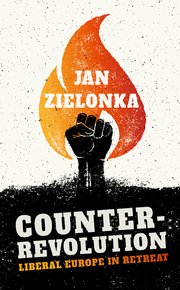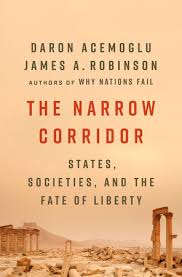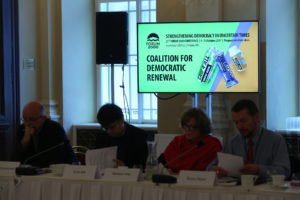 Creeping cooperation between mainstream parties and the populist right, unthinkable only a couple of years ago, has become strikingly common at the local level, with potentially cascading consequences for European democracy. Across Europe, embattled traditional parties are grappling with how to deal with the disruptive force of the far right: isolate and contain it, or work with it in hopes of winning back voters? the New York Times reports.
Creeping cooperation between mainstream parties and the populist right, unthinkable only a couple of years ago, has become strikingly common at the local level, with potentially cascading consequences for European democracy. Across Europe, embattled traditional parties are grappling with how to deal with the disruptive force of the far right: isolate and contain it, or work with it in hopes of winning back voters? the New York Times reports.
The main thesis of Daron Acemoglu and James Robinson’s new book, The Narrow Corridor: States, Societies, and the Fate of Liberty is that prospects for freedom and prosperity balance on a knife-edge between state oppression and the lawlessness and violence that society so often inflicts on itself, notes Dani Rodrik, Professor of International Political Economy at Harvard University’s John F. Kennedy School of Government.
The Narrow Corridor seems to be written in part to provide an account of the apparent fragility of liberal democracies. The authors coin the term “Red Queen Effect” to denote the ever-continuing struggle to uphold open political institutions. Like the character in the Lewis Carroll book, civil society has to run ever faster to keep up with authoritarian leaders and restrain their despotic tendencies, he writes for Project Syndicate:
 But, as I discuss in joint work with Sharun Mukand, liberal democracy requires more: rights that protect minorities (what we may call civil rights). The defining characteristic of the political settlement that generates democracy is that it excludes the main beneficiary of civil rights – minorities – from the bargaining table. These minorities have neither resources (like the elite) nor numbers (like the majority) behind them. The political settlement thus favors an impoverished kind of democracy – what one might call electoral democracy – over liberal democracy.
But, as I discuss in joint work with Sharun Mukand, liberal democracy requires more: rights that protect minorities (what we may call civil rights). The defining characteristic of the political settlement that generates democracy is that it excludes the main beneficiary of civil rights – minorities – from the bargaining table. These minorities have neither resources (like the elite) nor numbers (like the majority) behind them. The political settlement thus favors an impoverished kind of democracy – what one might call electoral democracy – over liberal democracy.
“This helps explain why liberal democracy is such a rare beast,” Rodrik adds. “What requires explanation is not the relative rarity of liberal democracy, but its existence. The surprise is not that few democracies are liberal, but that there are any liberal democracies at all.”

21st Forum 2000 Conference
Democratic renewal will be a principal focus of Forum 2000’s conference* on 13-15 October devoted to the theme ‘Recovering the Promise of 1989’, writes Tom Daly of Democratic Decay & Renewal (DEM-DEC). Democracy defenders from across the world will convene to “to analyze these challenges and search for ways to renew … and strengthen democracy.” Attendees will include Jan Zielonka, whose 2018 book, Counter-Revolution: Liberal Europe in Retreat, (above), emphasizes the need to ground liberal democracy in an equitable economy – which resonates with Tarun Khaitan’s new article on preventing excessive material inequality from becoming political inequality, or even plutocracy.
 At a forthcoming lecture, Wojciech Sadurski (right) will reflect upon the significance of the all-important parliamentary elections in Poland, and examine its implications for future developments in the context of the broader authoritarian populist turn around the world. The lecture, delivered a week after the elections, will be partly based on Sadurski’s recently published book, Poland’s Constitutional Breakdown. It will outline the origins of successful authoritarian populists and sketch their dominant modus operandi: that is, to hollow out constitutional institutions, and transform them from providers of effective checks and balances into loyal helpers of authoritarian rulers.
At a forthcoming lecture, Wojciech Sadurski (right) will reflect upon the significance of the all-important parliamentary elections in Poland, and examine its implications for future developments in the context of the broader authoritarian populist turn around the world. The lecture, delivered a week after the elections, will be partly based on Sadurski’s recently published book, Poland’s Constitutional Breakdown. It will outline the origins of successful authoritarian populists and sketch their dominant modus operandi: that is, to hollow out constitutional institutions, and transform them from providers of effective checks and balances into loyal helpers of authoritarian rulers.
Monday, October 21, 2019, 5:30 pm – 7:00 pm. Central European University, Budapest Campus, Nador u. 15, Room : Auditorium A. RSVP
*Supported by the National Endowment for Democracy.







